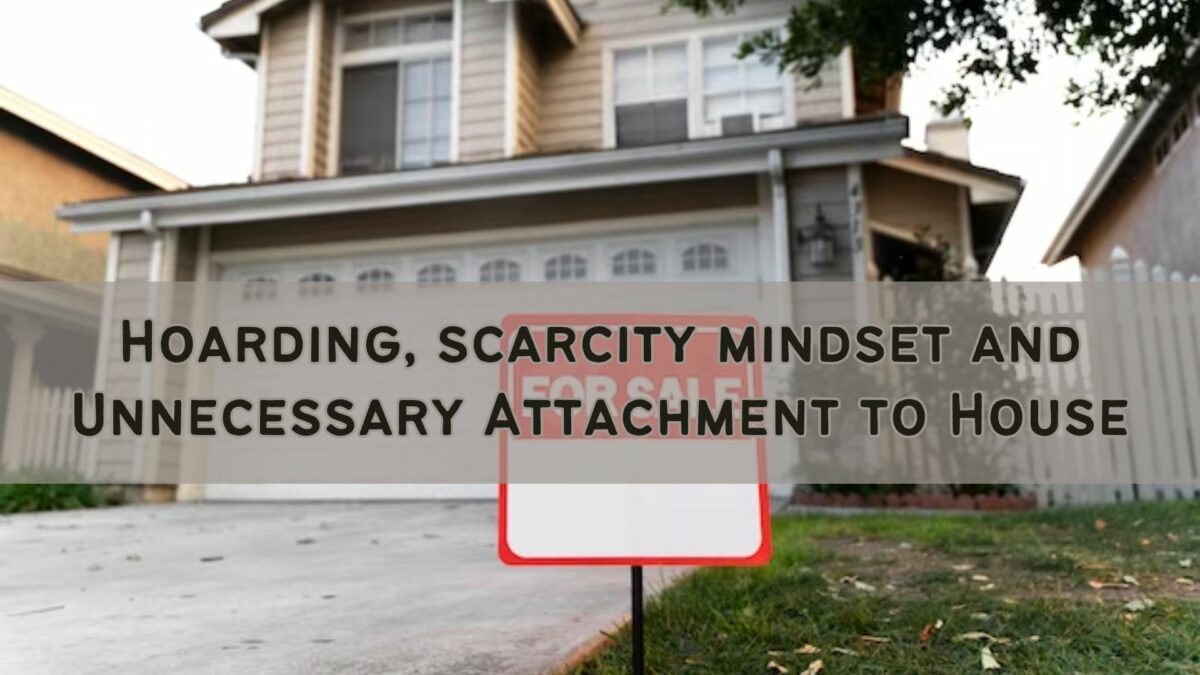“I steal cracker packets. I hoard them. Once my collection is large enough, I’ll take them to the flea market and try to sell them to discerning lovers.”
– Jarod Kintz

My parents like to watch the show American Pickers, so when we go home for the holidays, we usually wind up watching an episode (or 20) of the show.
For those of you who don’t watch much TV (like me), the basis of the show is that the stars are experts at reselling valuables – kind of like high end pawn shop people – and they go around the country sifting through junkyards, homes, estate sales, whatever to find the valuables in the piles of crap that people have accumulated.
Invariably, they arrive at a house or barn and there’s someone there to tell stories about good ol’ Aunt Clare (not her real name) who loved collecting cat sweaters or some such “collectible.” However, somewhere in the process of collecting high end cat sweaters, Aunt Clare got on a roll. As a result, every room in the house is filled with useless crap and a couple of worthwhile cat sweaters.
It’s the job of the American pickers to sift through the crap and buy worthwhile cat sweaters so they can take those cat sweaters home and resell them for a hefty profit.
What they never show is how the poor yutz who is left behind has to deal with all of the other useless garbage that Aunt Clare collected over the past 75 years before becoming buried in it one day and suffocating because she was unable to escape.
Side train of thought: How do these people make enough money to afford to buy all of this stuff? It doesn’t just magically appear in your spare bedroom, like how coat hangers reproduce. Am I the only one who watches these shows and wonders what the household budget of a typical hoarder looks like (assuming one exists)?
- Food: $300
- Mortgage: $800
- Car: $200
- Cat sweaters: $5,850
But what happened to poor Aunt Clare in the first place? She had a nice little collection of a few worthwhile, potentially valuable cat sweaters, and somewhere along the way, she rockets herself off the cliff and winds up with a house full of rubbish.
According to Psychology Today’s Matthew Shanahan, at some point along the way, with a typical hoarder, the ability to estimate how much pleasure a given object will give that person gets out of whack. A rational person (which, to be fair, nobody is truly homo economicus) would make a rough guess at how much pleasure a given item or experience would provide and then come up with a price scale for it. All pleasures have relative values, so we spend varying amounts on them.
By the way, we tend to overestimate the pleasure that we get from material goods (unless there is an associated memory or sentiment attached to that item) and underestimate the pleasure that we get from experiences, leading us to spend way too much money on stuff vis-a-vis experiences.
A hoarder, on the other hand, skews the expected pleasure from an item way off the scale while keeping the price scale relatively constant. Thus, a $10 cat sweater suddenly will provide, to the hoarder, way more entertainment and pleasure than it would to the average cat sweater aficionado.
To further complicate the hoarder’s situation, he or she then runs into Prospect Theory. As we saw in “Will Annuities Make You Happier,” Prospect Theory makes you expect more pain from losing something than joy you would get at receiving something of the same value.
So, the hoarder buys a cat sweater (or something else), finds it’s not as fun as expected, but thinks that getting rid of the cat sweater will cause more pain, and she or he might one-day regret getting rid of that cat sweater. Thus, up into the attic/spare bedroom/closet/kitchen/car, it goes along with all of its friends.
Additionally, the hoarder thinks in terms of a scarcity mindset (much like a politician, as we saw in “The Scarcity Mindset, The Abundance Mindset, and the Impact on Public Policy”). That line of thinking leads the hoarder to believe that there are only so many cat sweaters in the world, so he or she needs to scarf up (haha! get it?) as many cat sweaters as possible before they run out.
OK, you may be thinking. That’s all well and good. We’ve done a thorough psychological evaluation of the people that we see on some of those “reality” shows.
So what?
Does Your House Cause You to Become a Hoarder?

If we step back and think about the issues that cause hoarders to become hoarders in the first place—inability to appropriately value the utility/pleasure from a given item, fear of loss, and scarcity mindset—then perhaps we can see a situation where it’s not just a mental misfiring that causes issues, but something in our own lives.
That area is in housing.
Think of it. You hear the story line that the National Association of Realtors loves to feed the public: home ownership is the American Dream (no, the American Dream is Dusty Rhodes). They show you images of houses with white picket fences, husband and wife, and 2.5 children. They then have to sew the half child back together, which is a real pain.
To further the story, they tell you that a house is an investment, conveniently bypassing the fact that residential real estate doesn’t even beat inflation.
You buy into the story (which we did). You tell yourself that you’re handy and that you love home maintenance. You enjoy cutting the lawn because it gives you a chance to relax and meditate. Were that the case, you’d mow the lawn a whole lot more than you do.
You also only think about the mortgage payment on the house because that’s what the Realtor wants to do so that you’ll buy way more house and make the Realtor way more in commissions. You blithely ignore the other costs associated with owning a home, like replacing the roof every once in a while. You forget about property taxes and insurance, because those will get rolled into your PITI so you don’t have to think about them as a separate line item.
You also discount how much of a pain in the butt that commute is going to be.
But, once you bite the bullet, you become committed. You start to think of it, not as a house, but as a home, and it’s YOUR home. The nesting instinct kicks in, and you go raid Aunt Clare’s house for some knick knacks to put all over the place to make that house feel more like a home.
As you get older and have kids, you start to add other characteristics to the house. It was where Junior and Juniorette grew up. You want to leave a legacy, leave the house to the kids.
All of these thoughts contribute to the same psychological misfiring that happens with hoarders.
Misestimating utility: You pay for a house, expect it to return money for you, and provide you with happiness. The reality is that if you have a mortgage, then you’re losing money, on an inflation-adjusted basis, if you’re the average houseowner. Furthermore, the house provides shelter. That’s its primary purpose. The other pleasures you derive from a house are things that you do, which can be accomplished anywhere.
Prospect theory: You start to feel an attachment to the house. It’s your house. Because you think of it as your house, Monkey Brain pipes up and causes you to mentally jack the value of the house up, probably above what the market will actually support. We saw why this happens in “The Endowment Effect: Why You Should Buy a Foreclosure and Never Sell to an Investor.” As a result, you value your house more than you would a carbon copy next door.
Scarcity mindset: You imagine that there could be no other house just like the one that you have and that nothing could replace where you are now, even though there are probably plenty of places that you could move to or build that would provide just as much, if not more happiness.
Some of you may truly get the utility out of a house that you expect to, and the amount you’re paying all in is a good deal.
However, I am willing to wager (and based on my experience with my clients, I’ve seen this enough to know that I’m good money on this bet) that for many of you, owning a house hasn’t been all that the Realtors cracked it up to be.
What’s the solution? There’s not a given one-size-fits-all solution to this problem. Downsizing is usually a good start. So is renting, which is what we did.
Do you own your house? Are you happy with it? Or, do you, deep down, wonder if you’re facing the “in for a penny, in for a pound” scenario?
Let’s talk about it in the comments below!
Author Profile
- John Davis is a nationally recognized expert on credit reporting, credit scoring, and identity theft. He has written four books about his expertise in the field and has been featured extensively in numerous media outlets such as The Wall Street Journal, The Washington Post, CNN, CBS News, CNBC, Fox Business, and many more. With over 20 years of experience helping consumers understand their credit and identity protection rights, John is passionate about empowering people to take control of their finances. He works with financial institutions to develop consumer-friendly policies that promote financial literacy and responsible borrowing habits.
Latest entries
 Low Income GrantsSeptember 25, 2023How to Get a Free Government Phone: A Step-by-Step Guide
Low Income GrantsSeptember 25, 2023How to Get a Free Government Phone: A Step-by-Step Guide Low Income GrantsSeptember 25, 2023Dental Charities That Help With Dental Costs
Low Income GrantsSeptember 25, 2023Dental Charities That Help With Dental Costs Low Income GrantsSeptember 25, 2023Low-Cost Hearing Aids for Seniors: A Comprehensive Guide
Low Income GrantsSeptember 25, 2023Low-Cost Hearing Aids for Seniors: A Comprehensive Guide Low Income GrantsSeptember 25, 2023Second Chance Apartments that Accept Evictions: A Comprehensive Guide
Low Income GrantsSeptember 25, 2023Second Chance Apartments that Accept Evictions: A Comprehensive Guide

